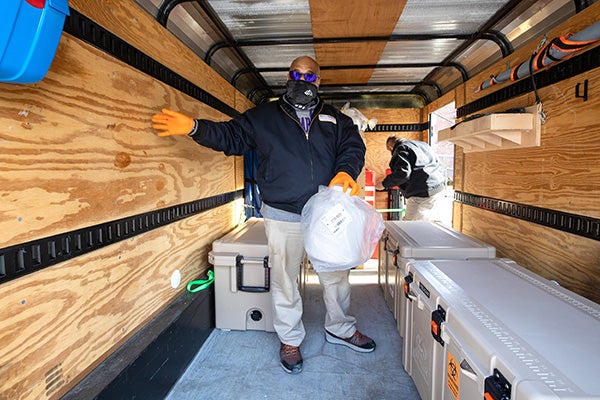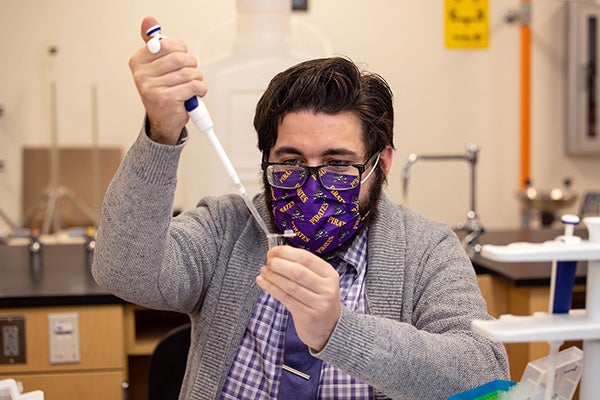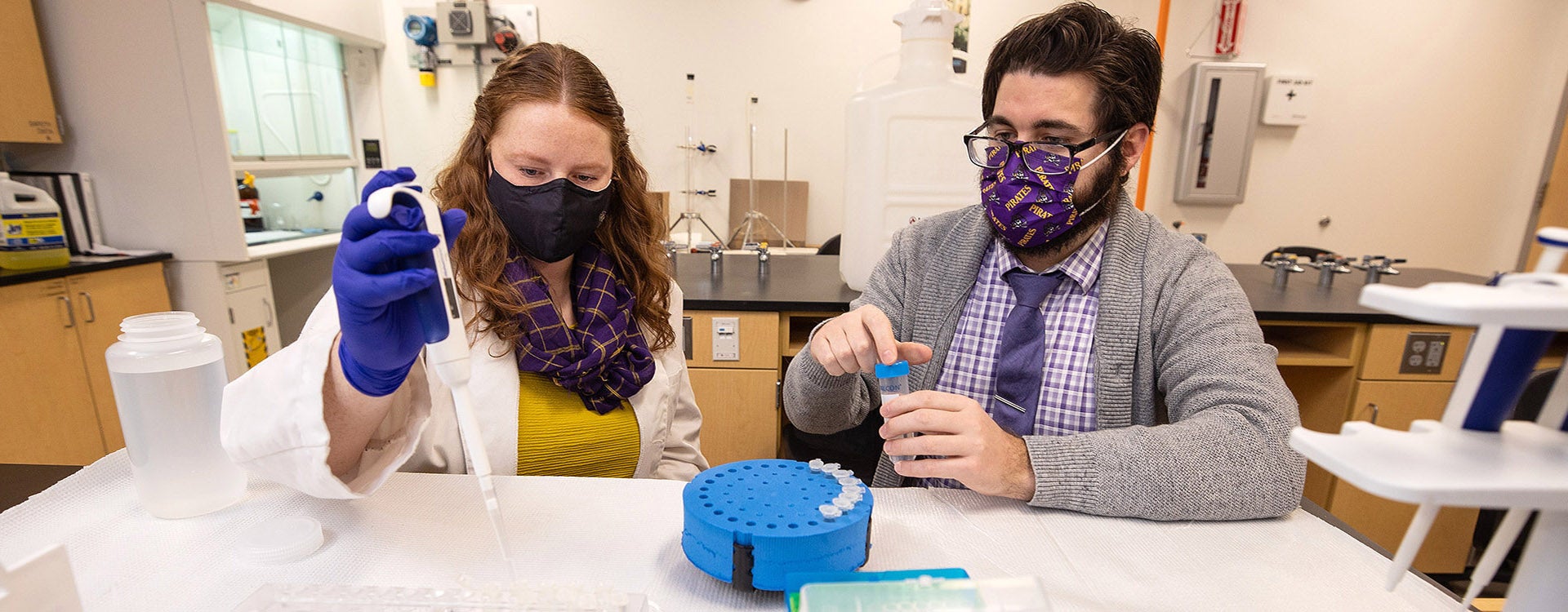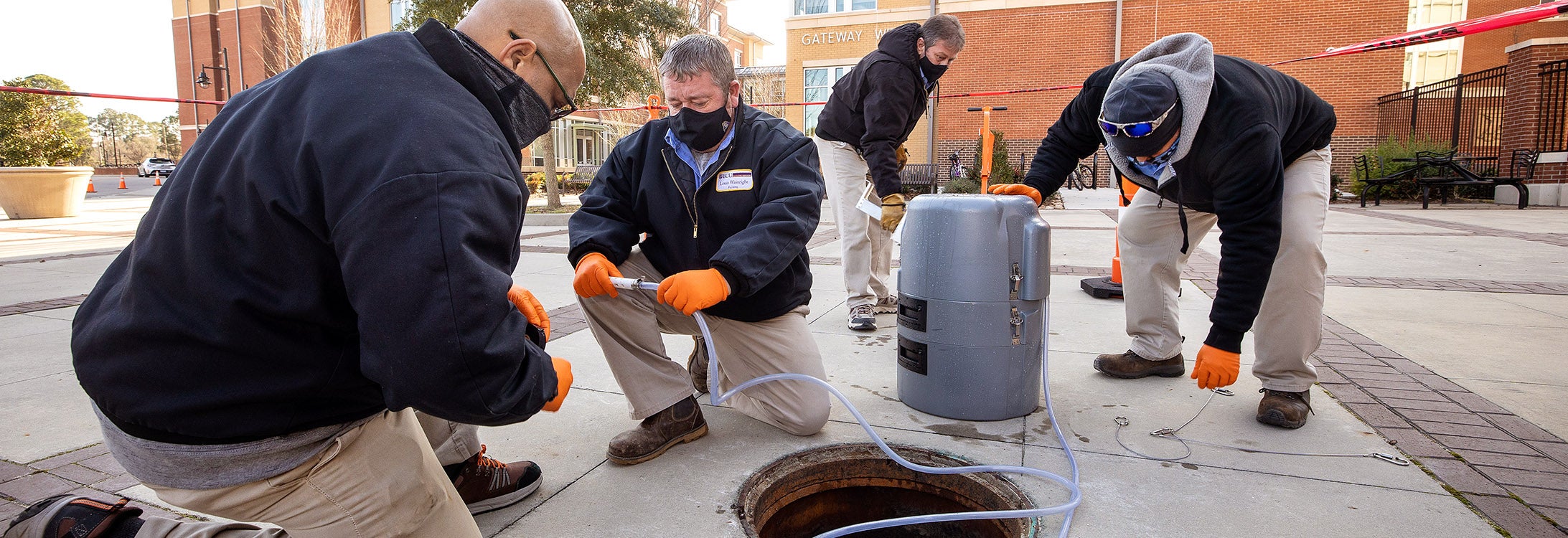‘GAME CHANGER’
ECU tests wastewater from residence halls
East Carolina University will test wastewater from residence halls this semester in an effort to detect coronavirus as early as possible to reduce transmission and avoid outbreaks where students live.
“It’s a game changer from the perspective that it gives you an opportunity to identify and isolate before clusters appear,” said Jim Menke, manager of ECU’s surveillance testing project. “The goal is to find someone who is not exhibiting symptoms before they infect others.”

Plumbing supervisor Derrick Anderson shows a mobile unit designed specifically for ECU’s wastewater testing.
Several departments across campus are collaborating to collect, process and analyze wastewater samples triweekly from residence halls. Follow-up diagnostic testing will be conducted with students if any samples come back positive.
About 1,900 students are living on campus this spring. COVID testing is required for on-campus students and is recommended for students off campus.
“The primary driver for screening wastewater is to guide rapid testing and contact tracing efforts to mitigate clusters from forming,” said Dr. Guy Iverson, assistant professor of health education and promotion, who is part of ECU’s testing team. “Some individuals may experience mild to no symptoms and these people would not likely seek out testing, which can result in unintended transmission of the virus. Carriers of the coronavirus, both symptomatic and asymptomatic, shed the virus and viral debris in their waste for 14 to 21 days.”
Autosamplers have been deployed and programmed to withdraw concentrated, viral RNA-extracted wastewater samples from residence halls.
Facilities services staff members led by Griffin Avin and Mike Rowe are collecting and transporting samples as well as providing clean replacement bottles for each sampling cycle. The autosamplers are set to pull 20 milliliters every 15 minutes per cycle, said Avin, director of facilities services for health sciences.
Once collected, the composite samples are delivered to ECU’s environmental health sciences lab where Iverson, Dr. Charles Humphrey and Avian White in the Department of Health Education and Promotion in the College of Health and Human Performance are working with students to process and prepare the samples for real-time polymerase chain reaction analyses. From there, the samples are delivered to Dr. Jay Fallon in the Brody School of Medicine Department of Pathology and Laboratory Medicine, whose team analyzes the tests. The results are then communicated to Dr. LaNika Wright, director of Student Health Services, and her team.

ECU assistant professor Guy Iverson works in the environmental health sciences lab in the Carol Belk Building.
“These analyses are designed to detect genetic material unique to the severe acute respiratory syndrome coronavirus (SARS-CoV-2), which is responsible for the global pandemic that began late in 2019,” Iverson said. “You can think of these tests as a way to ‘fingerprint’ the virus. If you find the virus ‘fingerprint’ (its genetic material), then you’ve positively identified the virus in a sample.”
In all, more than 1,000 samples will be pulled from manholes outside of residence halls this spring. The testing could continue into the summer, Iverson said.
“I’m excited that we have the opportunity to provide this type of COVID testing to help keep these kids on campus,” said Derrick Anderson, plumbing supervisor and one of the facilities services staff members responsible for collection. “This is for the kids. If there’s something there, we’ll know.”
ECU carpenters upfitted two trailers to transport and store all the equipment needed for the project, including large coolers used for ice and samples. Everything is sanitized before each collection. Bottles will be cleaned and sanitized in the lab for reuse, Avin said.
“When ECU said, ‘We want a sampling program,’ we jumped on it, and all of us pulled together,” Avin said. “It’s really a great opportunity for the university to keep our students on campus.”
Other departments that are involved in the project are Environmental Health and Safety, Office of Prospective Health, Campus Operations, and the Division of Research, Economic Development and Engagement.
ECU officials talked with staff at other universities such as UNC-Charlotte and the University of Arizona, which was one of the first in the nation to adopt wastewater screening among student populations and has served as a model for other institutions.

Iverson watches as graduate student Melissa Nolan works in a water testing lab in the Belk Building.
